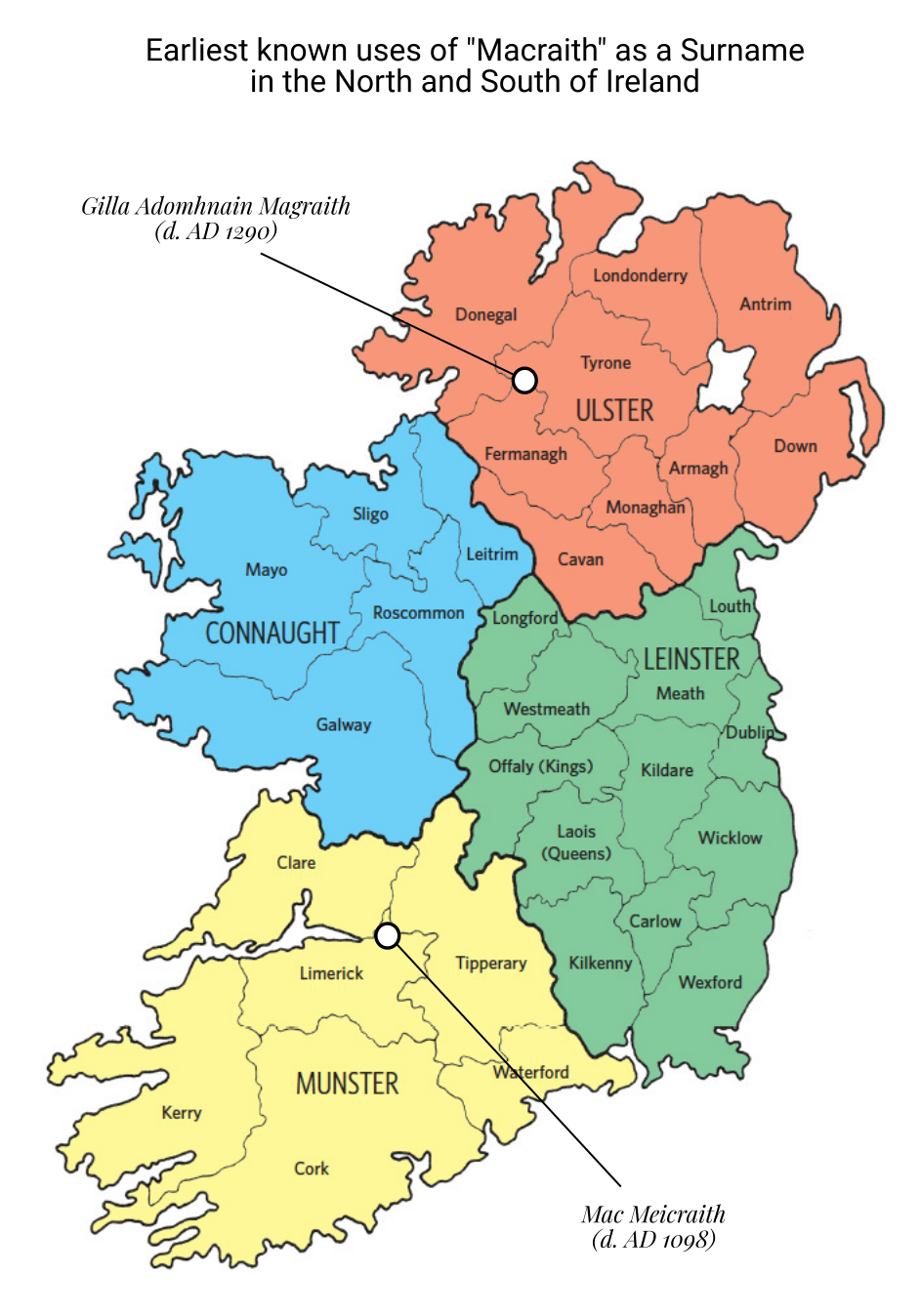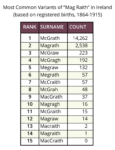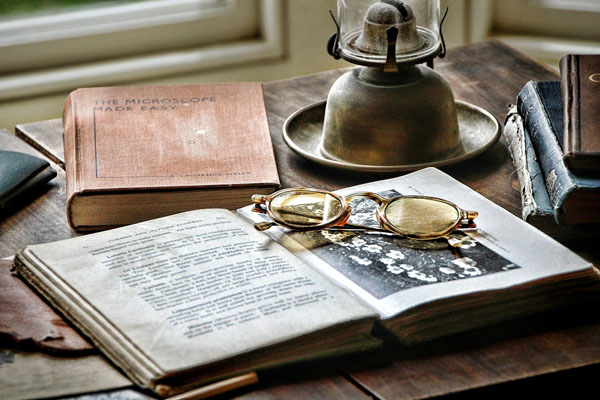The Story of the Megraw Surname: From Gaelic Origins to Anglicization
Ireland in the 10th century was one of the first countries in Europe to adopt hereditary surnames and the reason is quite simple. Irish society in medieval times was based on clans (or kinship groups descended from a common ancestor) where family ties were an important part of everyday life. What you owned, the type of work you did, your legal rights … these were all determined by who you were related to. In order to better identify allegiance to a particular clan or kinship group, our ancestors began using patronymic surnames.
A patronymic surname is one that has been derived from the personal name of a father or a grandfather. In Ireland, the prefix “Mac” (or Mag) was added to denote son of, and the Irish “Ua” (or O’) was used to indicate grandson of.
By Mac and O you’ll surely know
True Irishmen they say;
But if they lack both ‘O’ and ‘Mac’
No Irishmen are they.
The Origins and Transition of the Megraw Surname
The surname “Megraw” is of Gaelic origin and can be traced back to two forms of the name in ancient Irish—Mac Graith and Mag Raith. It is interesting to note that Mac Graith means ‘son of Craith’ rather than ‘son of Graith’ as one might expect. Therefore, we often see the surname written in many texts as Mac Craith or Meic Craith (collective form), a practice that will be adopted here. This peculiarity could be attributed to the fact that the name did not originate as a surname.
Unlike many other Irish surnames, Megraw was initially used as a first name rather than a last name among the Irish. The name “Macraith”, meaning ‘son of grace’ or prosperity, was first recorded as a forename used by an individual named “Macraith the wise” in an old Irish poem describing prominent members of St. Patrick’s household in AD 448.
The transition of Macraith from a first name to a last name occurred during the early 11th century. It was primarily adopted by two prominent families—one in the former kingdom of Thomond in the southern province of Munster and another in the northern province of Ulster. The first family, known as the dal gCais tribe (Dalcassians), were descendants of Cormac Cas, whose father Olioll Olum was the King of Munster during the 3rd century. Mac Meicraith, a poet belonging to this family and a grandson of Brian Boru’s brother, was the first to use Macraith as a surname. According to the Annals of the Four Masters, Mac Meicraith, the chief poet of Munster, passed away in 1098 AD.
from a first name to a last name occurred during the early 11th century. It was primarily adopted by two prominent families—one in the former kingdom of Thomond in the southern province of Munster and another in the northern province of Ulster. The first family, known as the dal gCais tribe (Dalcassians), were descendants of Cormac Cas, whose father Olioll Olum was the King of Munster during the 3rd century. Mac Meicraith, a poet belonging to this family and a grandson of Brian Boru’s brother, was the first to use Macraith as a surname. According to the Annals of the Four Masters, Mac Meicraith, the chief poet of Munster, passed away in 1098 AD.
The other family that adopted Macraith as a surname resided in the western border region of County Donegal in Ulster and were coarbs, or hereditary guardians of the church lands in the area clergymen. Their association with the name dates back to at least the 13th century, and the earliest known member of this family to bear the surname was Gilla Adomhnain Magraith, who died in AD 1290.
Anglicization and the Emergence of Different Spellings
After the English legislation implemented the anglicization of the Irish language in the late 16th century, various spellings of the Mac Craith surname emerged, such as MacGrath, McGrath, Magrath, MacGraw, Magra, Magraw, McGraw, Megraw, Magragh, Megrath, and more.
One of the earliest documented instances of the “Megraw” spelling worldwide can be found in historical records from the state of Maryland. On July 27, 1721, Thomas Megraw submitted a request to the British American colony’s government, seeking payment for guarding one of their prisoners. In Ireland, due to the scarcity of available historical records, the surname does not appear before 1801 when the last will and testament of “Peter Megraw” from Ballyvarley, Co. Down, was probated in Belfast.
 However, by the late 19th century, the “McGrath” surname had become the most widely adopted English version of Mac Craith throughout Ireland. It’s worth noting that the ‘th’ in McGrath is typically silent, and the name is pronounced as ma-GRAH or muh-GRAH.
However, by the late 19th century, the “McGrath” surname had become the most widely adopted English version of Mac Craith throughout Ireland. It’s worth noting that the ‘th’ in McGrath is typically silent, and the name is pronounced as ma-GRAH or muh-GRAH.
Conversely, “McGraw” is less common and appears to be more regionally concentrated, primarily found in the northern part of the country. The “Megraw” surname’s geographic distribution is even more localized, primarily restricted to the counties of Down and Antrim. It remains a mystery as to why an “e” was adopted for “Megraw” instead of a “c” that is found in the more popular “McGraw” surname.
The Megraw Legacy: A Tale of Language, Culture, and Heritage
The Megraw surname exemplifies the intricate interplay between language, culture, and heritage in Ireland. From its Gaelic origins to the subsequent anglicization, this unique surname reflects the evolution of Irish surnames as a whole. While the “Megraw” spelling is less common compared to other variants, it proudly represents the legacy of Irish ancestors who made significant contributions across various fields and professions worldwide. Today, descendants of Megraw bearers can be found in different corners of the globe, a testament to the enduring diaspora and migration of Irish heritage. The Megraw surname stands as a symbol of the rich tapestry of Irish history, offering a captivating glimpse into the complexities of Irish lineage and its global influence.




